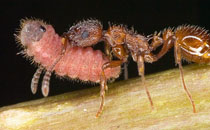Social Parasitism : Blue Butterflies in Ant Colonies
Biology 342 Fall 2011
Ellen Levkoy & Rachel Strominger
Adaptive Value
Adaptive value is a measure of how selectively advantageous a paricular behavior is over other potential strategies that might have evolved or that closely related past or present species exhibit [99].
Risks and payoff of parasitism

Adopting a parasitic lifestyle comes with some risks: Maculinea puts itself at the mercy of the health of the Myrmica population. If Myrmica were to become scarce, the M. rebeli would not be able to survive on their own. Additionally, while waiting to be picked and taken to a Myrmica colony, the larvae are easily carried off by predators or simply the wrong species of Myrmica. In fact, the majority of Maculinea larvae are taken back to the nests of Myrmica species that do not provide a suitable habitat for their development, although their use of further chemical camouflage once in the nest allows them to survive in non-host nests when food is abundant [13]. Additionally, though many Myrmica species have been found to adapt specifically to one host species [13], recent research suggests that some Maculinea are not picky about which species of Myrmica ant colony they will parasitize. They may not have adapted to any specific species to enable them to have more opportunities for finding an accepting local nest within their range, at the expense of more closely resembling the semiochemical and acoustical characteristics of one species of Myrmica.
These risks necessitate a very high survival rate once successfully in a host nest. The queen impersonation on top of the chemical mimicry ensures that even when food is scarce, the Maculinea larvae will not be the one to go hungry. Additionally, using a parasitic approach as opposed to a predatory one (like some Maculinea species) makes for greater evolutionary stability; a chemical arms race between Myrmica and Maculinea, with the ants adapting to produce semiochemicals distinct from the caterpillars and the caterpillars adapting to catch up, would only be brought on if the cost to Myrmica of adapting was lower than the cost of taking care of the Maculinea larvae. Parasitism keeps this latter cost relatively low compared to predation, making a chemical arms race less likely [13].